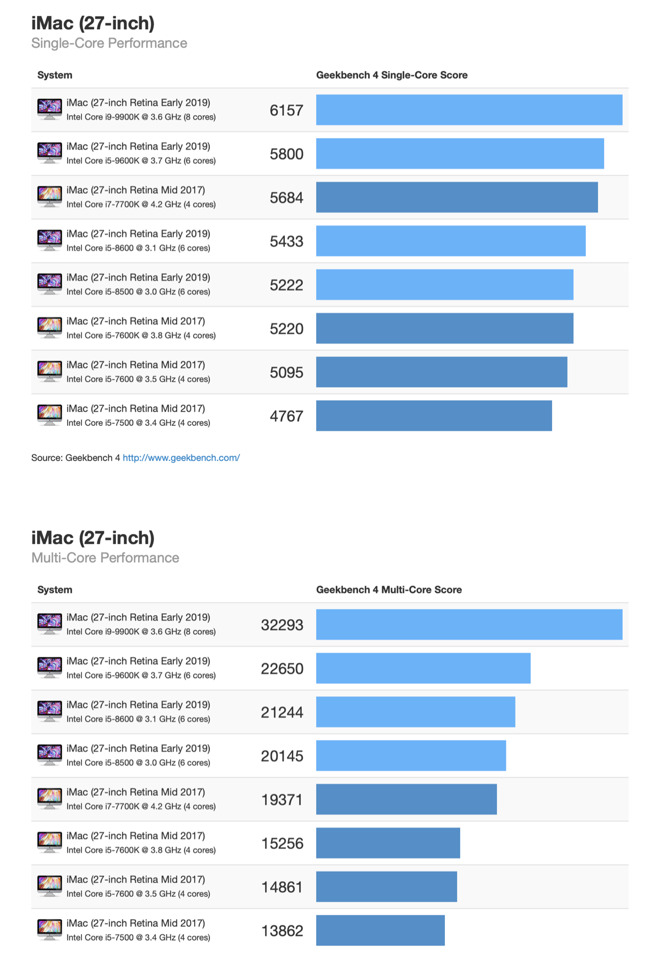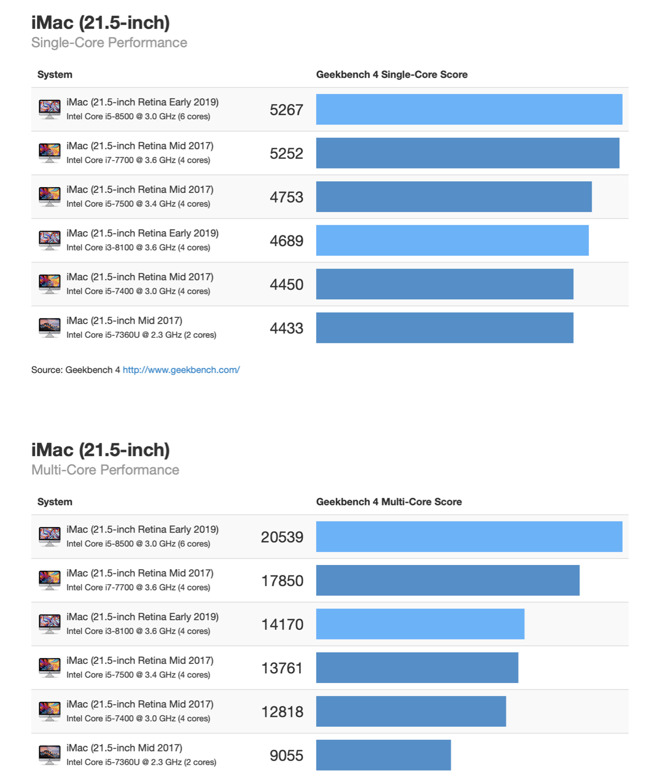2019 iMac performance ranges from 5% to 66% increase over previous models
The new 2019 iMacs have just started being delivered to customers, and there are now a wide set of benchmarks that span the entire refreshed lineup.

2019 4K iMac
Shared by Geekbench's John Poole, the new benchmarks show the impressive gains of the Intel 8th and 9th-generation Coffee Lake chipsets. The benchmarks were naturally from Geekbench 4's CPU and GPU tests.

The biggest boost in the new 2019 iMacs was the 27-inch Core i9 processor which has a multi-core score up 66 percent. The rest of the 27-inch 5K models had multi-core gains of between 43 percent and 49 percent and a range of 6 percent to 11 percent for single core.
Poole credits the increases in speed largely to higher frequencies and more cores rather than any significant change in Intel's architecture.
Additionally, the new six and eight core machines were competitive with the eight- and ten-core iMac Pro. As an example, the 10-core iMac Pro is only 10 percent faster on the multi-core test compared to the 8-core iMac and is 16 percent slower in the single-core test.

The 21.5-inch models didn't have quite as impressive gains as the 27-inch did, but still 5-10 percent higher in single-core and 10-50 percent higher in multi.
Those who regularly use apps that take advantage of multi-core systems should see the best performance though Poole says it isn't enough to "justify upgrading" if you've got a 2017 iMac.
Check out AppleInsider's own comprehensive benchmarks of the new 21.5-inch 4K iMac to see how it performed in all the other tests as well.

2019 4K iMac
Shared by Geekbench's John Poole, the new benchmarks show the impressive gains of the Intel 8th and 9th-generation Coffee Lake chipsets. The benchmarks were naturally from Geekbench 4's CPU and GPU tests.

The biggest boost in the new 2019 iMacs was the 27-inch Core i9 processor which has a multi-core score up 66 percent. The rest of the 27-inch 5K models had multi-core gains of between 43 percent and 49 percent and a range of 6 percent to 11 percent for single core.
Poole credits the increases in speed largely to higher frequencies and more cores rather than any significant change in Intel's architecture.
Additionally, the new six and eight core machines were competitive with the eight- and ten-core iMac Pro. As an example, the 10-core iMac Pro is only 10 percent faster on the multi-core test compared to the 8-core iMac and is 16 percent slower in the single-core test.

The 21.5-inch models didn't have quite as impressive gains as the 27-inch did, but still 5-10 percent higher in single-core and 10-50 percent higher in multi.
Those who regularly use apps that take advantage of multi-core systems should see the best performance though Poole says it isn't enough to "justify upgrading" if you've got a 2017 iMac.
Check out AppleInsider's own comprehensive benchmarks of the new 21.5-inch 4K iMac to see how it performed in all the other tests as well.

Comments
You can debate processors all day long, but faster drives make a significant difference to the end user experience as anyone who's upgraded a sata hdd to ssd will know.
By by the way I’m not blaming Cook here at all asApple has a long history of this sort of behavior. Back in the power PC days Jobs always focused on floating point performance while integer unit performance sucked on Power PC. Again the goal was to make the product appealing by getting people to accept a different metric.
Frankly Apple has recently gotten much worse with this nonsense which is one reason I find it harder to suggest that anybody buy a Mac. The products are simply too expensive for what you get.